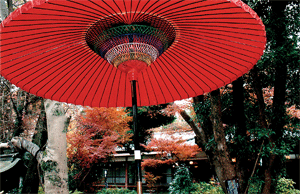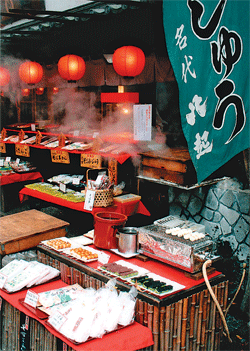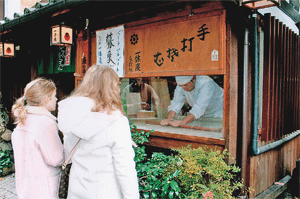
 Jindaiji is Tokyo’s second oldest temple, and honors the water god, Jinja Daio. Sure enough, we heard and saw running water as soon as we approached the grounds. The surrounding streets are reminiscent of a much older Tokyo; large red parasols offer color and shade, and vermilion bridges cross carp filled streams.
Jindaiji is Tokyo’s second oldest temple, and honors the water god, Jinja Daio. Sure enough, we heard and saw running water as soon as we approached the grounds. The surrounding streets are reminiscent of a much older Tokyo; large red parasols offer color and shade, and vermilion bridges cross carp filled streams.Jindaiji is famous for soba: there are soba shops everywhere! Visitors can observe firsthand the importance of water in the traditional process of soba making. Kids will enjoy watching the large water wheel in action, which was used to grind buckwheat to flour. They can then see te-uchi (handmade) soba being rolled out right in the shop-front windows. The only difficulty was choosing where to eat our soba lunch from the variety of picturesque indoor and outdoor eating spots!
Our family also enjoyed painting pottery at the shop just outside the temple gates. For inexpensive prices (starting at ¥200), we chose from a selection of dishes and cute children’s items. As 2006 is the “Year of the Dog,” there was a good selection of ceramic dogs, as well as the other animals for each particular year. Our pieces were ready in 20 minutes.
If time allows, you can visit the large Jindaiji Botanical Gardens, (entrance behind the temple) which is planted so that something flowers all year round. There is also a terrific smaller portion of these gardens, free of charge, located just across the street from Jindaiji. Our kids got great exercise running on the long wooden walkways and exploring short nature trails, and were happily tired out before the ride home.
 Jindaiji’s biggest festival, the Daruma Ichi, takes place on March 3rd and 4th. Daruma are the distinctive red papier-mâché heads sold with unpainted eyes. (You paint in the first eye while setting a goal, and then paint in the second eye upon its completion.) Stalls selling daruma will fill the temple grounds during the festival, which draws large crowds. If you prefer a quieter experience, daruma are sold year round at
Jindaiji’s biggest festival, the Daruma Ichi, takes place on March 3rd and 4th. Daruma are the distinctive red papier-mâché heads sold with unpainted eyes. (You paint in the first eye while setting a goal, and then paint in the second eye upon its completion.) Stalls selling daruma will fill the temple grounds during the festival, which draws large crowds. If you prefer a quieter experience, daruma are sold year round at
Jindaiji - and it is a worthwhile day trip at any time of the year.
Limited parking available.
Trains: Chofu Station, Keio Line or Mitaka Station, Chuo Line.
North exit, Take local taxi to Jindaiji